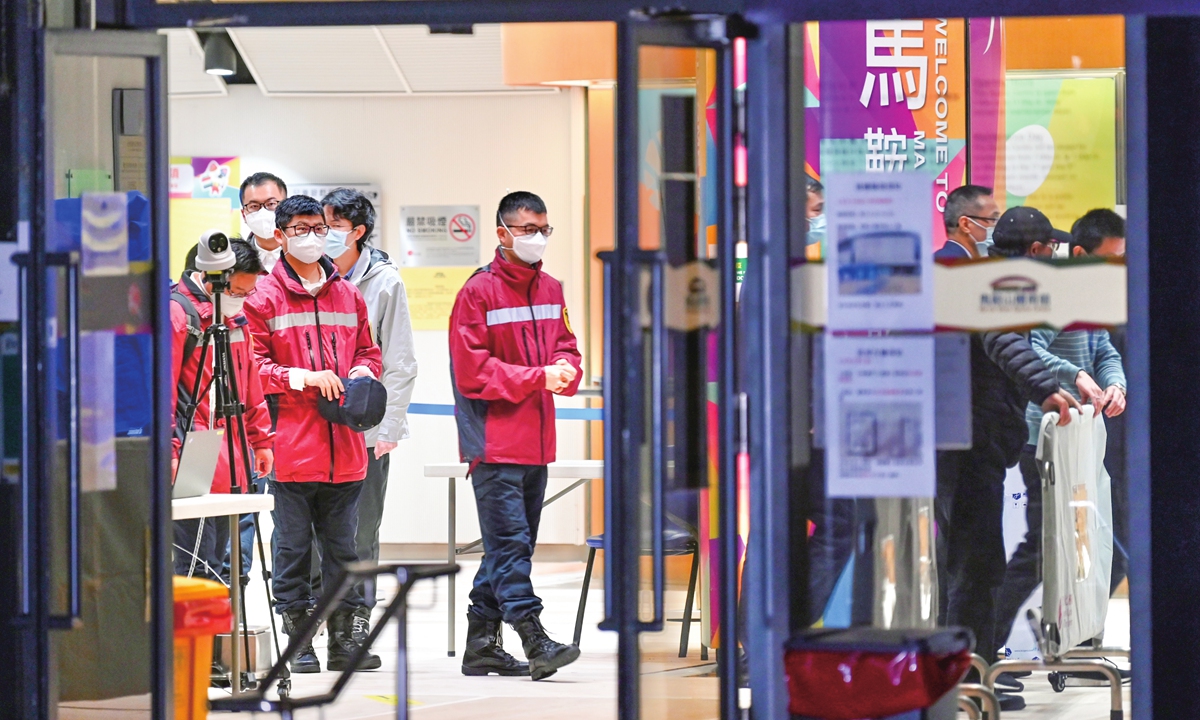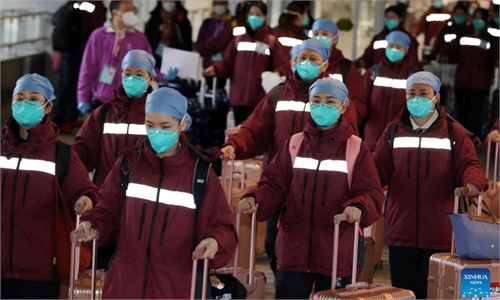
Epidemiologists from the Chinese mainland arrive at Hong Kong's Huo-Yan Laboratory to learn about the epidemic situation on February 17, 2022. The first group of mainland epidemiologists and vehicles for nucleic acid testing arrived in Hong Kong to assist the city to tame the severe COVID-19 outbreak. Photo: cnsphoto
Test kit suppliers and the operators of Huo-Yan nucleic acid test laboratories responded swiftly on Friday to Hong Kong's latest pandemic situation, which has seen daily infection cases rising in their thousands.
Amid the current resurgence of COVID-19, Hong Kong reported 3,629 new confirmed cases on Friday and about 7,600 initially diagnosed positive cases, raising the number of reported cases on the day to over 12,000, according to local media reports.
Guangzhou-based coronavirus test kit maker Wondfo Biotech Co said in a statement sent to the Global Times on Friday that as a company that has repeatedly aided global efforts to fight the pandemic, the company will use "every resort" and pledged "full support" to aid Hong Kong.
The company's antigen detection product takes only 15-20 minutes to yield results, much faster than nucleic acid tests, so the feature has good potential to be applied for massive preliminary screening and it could save precious time for patients with severe and acute disease.
"A team of specialists has been assembled at Wondfo and could be sent to Hong Kong at any time," a company source told the Global Times on Friday.
Meanwhile, the third of three "Huo-Yan" nucleic acid test laboratories arrived in Hong Kong on Thursday to fight the pandemic in the city, Chinese genomics firm BGI Group confirmed with the Global Times on Friday, adding that the second Huo-Yan lab already arrived on Wednesday.
The first lab, which consists of 16 air-inflated film chambers and is equipped with around 100 testing facilities, was put into operation on Tuesday, immediately boosting Hong Kong's sample testing capacity by 100,000 tubes a day.
With three labs and adopting the reagent testing method, test capacity will be potentially multiplied to 900,000 to 1.5 million samples a day, BGI said.
"Adopting the reagent testing method is ideal when the epidemic is in its initial stage. But when faced with more positive cases, that approach is no longer ideal," said Liu Xing, who is in charge of the lab. "Whether to adopt the approach depends on the Hong Kong Special Administrative Region (HKSAR) government."
However, lack of personnel is a major bottleneck in raising nucleic acid test capacity, the company told the Global Times.
To achieve daily testing capacity of 3 million samples, which is needed to realize a dynamic zero-COVID strategy, an additional 1,000 workers will be required, another company executive told the Global Times on Friday. Currently, 400 workers from the mainland and Hong Kong are working at the lab.
Jiangsu Bioperfectus Technologies, another large test kit supplier, told the Global Times on Friday that inquires and orders for products including in-home tests from clients based in the HKSAR have been mounting in recent days.
Sansure Biotech, based in Central China's Hunan Province, told the Global Times on Friday that the company has sent a 10-member team to Hong Kong with aid materials.
Companies from the Chinese mainland are upping the ante in aiding Hong Kong's battle against the pandemic. The efforts include a new shipping lane from South China's Guangdong Province to the city for the shipments of epidemic control goods, as well as shipments of water, petrol gas and natural gas, according to media reports on Friday. Some companies also offered hotel rooms to be used as quarantine space.


